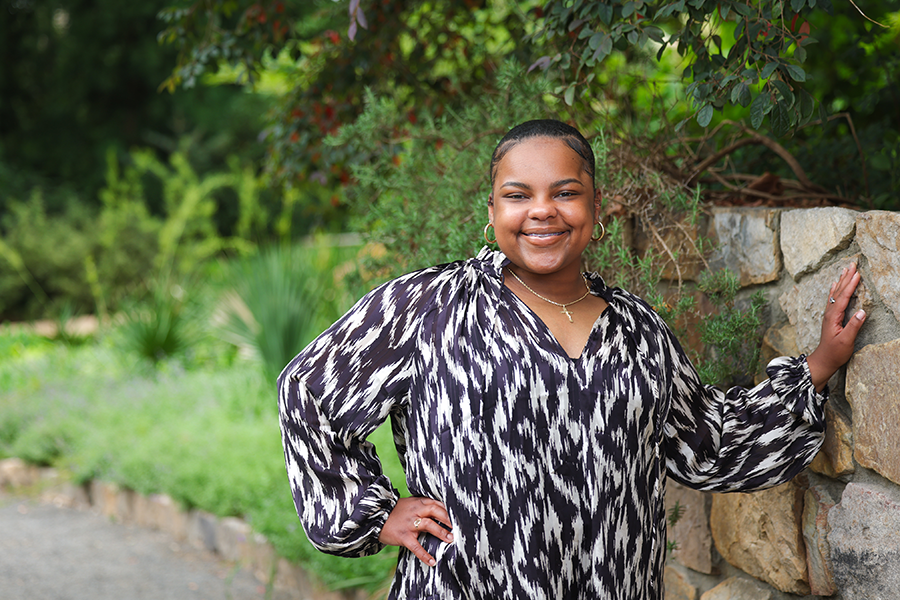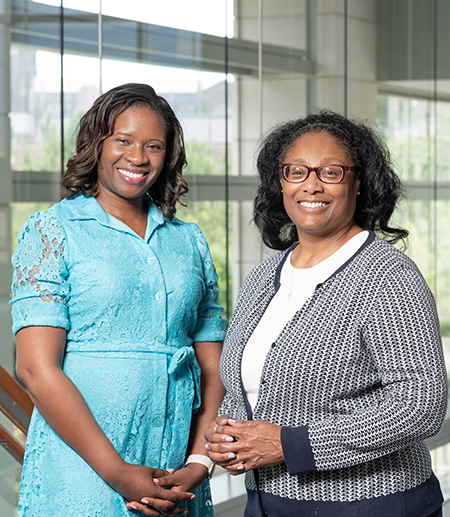
Leadership Program Spurs Transformation in Lupus Care
Managing the broad range of symptoms of lupus, a chronic autoimmune disease that can cause extreme fatigue, skin rashes, fever, and joint pain, left Uniqua Harris, of Durham, ready to “bash lupus ‘til you couldn’t bash it anymore.” A year ago, it was hard for her to stay positive, and she said she often doubted herself.
“Now, I literally don’t put ‘can’t’ in my vocabulary,” said Harris, 25, who has, following a diagnosis of lupus at age 9, benefitted from a new approach to lupus care that gives patients support with symptoms and stress.
Launched as a Duke Advanced Practice Provider Leadership Institute (APPLI) project, the lupus care model involves a rheumatologist, physician assistant, nurse practitioner, clinical social worker, psychologist, registered dietitian, and physical therapist. Together, they address patients’ medical and psychological needs to help improve their health.
Keisha-Gaye O’Garo, PsyD, an assistant professor in the Department of Psychiatry and Behavioral Sciences at the Duke University School of Medicine, and Karen McCain, a psychiatric nurse practitioner, lead the project that expands services offered to lupus patients at the Duke Young Adult Rheumatology Clinic.
The health care providers wanted to focus their APPLI project on a chronic medical illness with a significant impact on Black patients. Anyone can develop lupus, but women account for 90% of cases and it’s most common among Black and Latina women, ages 15-44.
“We decided to target lupus because it has extremely high mortality rates for Black females, in some cases at a very young age,” said O’Garo, a clinical psychologist at the Duke Pain Clinic. “And we need to start talking to one another about how to address some of the barriers they face and ensure we’re providing equitable health care.”
The approach has been a significant change for the clinicians on the team and led to health improvements for most of the 10 women who have participated so far, including Harris.
“I feel like I’m in a better headspace,” she said. “I’ve always been a driven person but having more medical providers on board has made me tap more into who I am and helped me embrace my illness.”

Her determination has paid off. In May, she earned her master’s degree in accounting from North Carolina State University, and she will launch her accounting career at Deloitte in Charlotte, North Carolina, this fall.
Passion for Integrated Care
The complex nature of lupus requires care from multiple medical specialists, which can be particularly challenging to navigate for someone experiencing severe pain and fatigue. On top of that, barriers to health care are prevalent among the lupus patient population.
“It’s not unusual to have patients who fall through the cracks, who get overwhelmed with the system and say, ‘Forget it,’” O’Garo said. “Patients often have difficulty with their providers talking to one another.”
O’Garo developed a passion for integrated care during a psychology internship at an intensive pain program at the Central Alabama VA Health Care System where veterans were cared for by kinesiotherapists, physical therapists, occupational therapists, nutritionists, and psychologists.
“I fell absolutely in love,” she said. “I saw this amazing change in veterans who came in disappointed, discouraged, even disillusioned, and by the time they left the program, they were using non-pharmacological interventions. I’d see hope in their eyes, and excitement, and a sense of control and confidence.”
She created a multidisciplinary non-pharmacological pain management program at Fort Liberty (formerly Fort Bragg) for active-duty service members before joining the Duke faculty. When O’Garo learned about the APPLI program and its team approach, she jumped at the chance to build a more holistic care model to better support those with lupus.
APPLI is a year-long program supported by the Duke Health Chancellor’s Office to develop a pipeline of health equity leaders. It supports advanced practice provider leaders as they work with interprofessional teams on projects to improve patient health, provider resilience, health care system efficacy, and community strength.
“It’s a professional development fellowship where our participants strengthen their individual and team-based leadership and management skills,” said Anh Tran, PhD, MPH, an associate professor in family medicine and community health and director of the program since its inception 10 years ago.
“It’s also structured like a project incubator model—the teams come in with a vision, and we provide them with coaching, new skills, and project development and management infrastructure to help them make that vision become a reality.”
When approached about the AAPLI project, rheumatologist Rebecca Sadun, MD, PhD, director of the Duke Young Adult Rheumatology Clinic and an assistant professor of medicine and pediatrics, embraced the opportunity to expand her small multidisciplinary team. At the time, the team included physician assistant Lisa Ray and clinical social worker Anne Fields, both from the Department of Family Medicine and Community Health.
Ray serves as the primary care provider for about half the patients, and for the others, she functions as a liaison between Sadun and the patient’s primary care provider. Also, she ensures lupus patients, who are immunocompromised, are up to date with vaccinations, health screenings, wellness information, and family planning services.
Fields helps lupus patients navigate barriers to treatment—such as assisting them in securing financial support for medications, addressing transportation challenges, and resolving insurance issues—and connects them to therapists, vocational rehabilitation and other key resources in their home communities.
In addition to their physical ailments, many of Sadun’s patients experience depression, anxiety, fatique and chronic pain, and she knew they would benefit from being able to access behavioral health care more easily through the new partnership.
Strategies to Support Living with Lupus
Once the project launched, O’Garo dedicated more of her clinical time to lupus patients, working in tandem with McCain to help meet patients’ behavioral health needs. McCain meets with the patients—alongside Sadun, Ray, and Fields—and identifies those who may benefit from counseling or medication, or both.

She also helps optimize patients’ complex medication regimens, working to maximize positive results while avoiding harmful interactions and minimizing side effects. McCain also oversees lupus patients’ infusions, which suppress the immune system to help patients achieve and maintain remission.
O’Garo provides therapy and behavioral health strategies, including teaching patients techniques to help them cope with pain, reduce stress, improve their sleep, and set appropriate boundaries to try to keep their illness in check.
“For many patients, anger starts to well up because they feel disappointed and betrayed by their bodies. I try to help them really listen to, engage with their body, and make decisions based on what their body is saying, so they can achieve that peace, that sense of life satisfaction, that control they’re looking for,” she said.
A few months after the project was underway, the team expanded again with the addition of physical therapist Sally Dunn, and registered dietician Maria Tucker.
“Quite a few of our patients have been on chronic high-dose steroids, which has resulted in weight gain, and they have a lot of pain, so it’s challenging for them to be physically active,” Sadun said.
Dunn, who specializes in Pilates and other low weight-bearing exercises, works with lupus patients to create a plan for staying active while not overexerting themselves.
Meanwhile, Tucker counsels some patients on weight loss or—for those with lupus nephritis (kidney inflammation)—reducing their sodium intake. But for many patients, she simply focuses on helping them understand how to take better care of themselves by eating more healthfully, and how adjustments in their diet can impact how they feel both physically and mentally.
“When patients begin to feel better, psychologically, they’re better able to prioritize other elements of care,” Sadun said. “They start to engage more with their health care teams.”
Better Patient Outcomes
An overarching benefit of the integrated approach is that it helps everyone—the patients as well as their providers—stay on the same page. Convening weekly as a team, along with the other clinicians, helps them understand patients more holistically, coordinate care more effectively, get patients into needed appointments quicker, and address gaps and barriers thoughtfully.
Since engaging in behavioral health, nutritional counseling, and physical therapy over the past year, women cared for by the lupus team showed tangible improvements in areas such as life satisfaction, cognition, body image, sleep, physical health, satisfaction with care, and social support.
McCain points to Harris as a shining example of the benefits of integrated care: “Uniqua improved her pain scores, her mood, and her physical activity. And she’s learned how to make affordable nutritious meals and how certain foods should be avoided because they can cause inflammation.”
Harris has also taken notice. “My doctors listened to me before, but now that I have all of these other teammates on board, I feel as though they listen to me more, and I’ve also noticed a difference with myself,” she reflected. “I feel like it’s helped a whole lot.”
Approach Supports Clinicians and Saves Money
The benefits of integrated care teams extend to the health care system.
Team members have learned from each other and empowered each other by sharing their different areas of expertise and stepped up to fill gaps revealed through their weekly conversations. The approach also reduces the burden of individual clinicians by spreading the care across multiple providers. In fact, pre- and post-program assessments of the team members using the Professional Quality of Life Scale showed a significant reduction in burnout and secondary traumatic stress.
"Over the first six months of her time in the rheumatology clinic, the time she spent in the hospital dropped in half, and over the next six months, it dropped another 80%.”
- Rebecca Sadun, MD, PhD
From a health care system perspective, intensively and proactively addressing the needs of patients who are otherwise high utilizers of health care saves money.
“One of our lupus patients spent about 50% of her days in an emergency department or hospital before she joined our clinic,” Sadun said. “Over the first six months of her time in the rheumatology clinic, the time she spent in the hospital dropped in half, and over the next six months, it dropped another 80%.”
O’Garo and others in her class celebrated their completion of the APPLI program in May, but the care team is committed to continuing and even building on the model they developed through APPLI.
“The sustainability is there because we have a committed group of people, we’re passionate about what we do, and we’re passionate about positive patient outcomes,” said McCain. “I would love to see this team continue to grow.”
Expansion could bring on a coordinator, a case manager, and an acupuncturist, as well as offering educational programming and support groups for patients.
“I’m grateful to the APPLI program for giving me this opportunity,” O’Garo said. “Uniqua and the other young women we’ve worked with are resilient in so many ways, and it has been a great pleasure and great honor working with the team.”
Susan Gallagher is the director of communications for the Department of Psychiatry & Behavioral Sciences.
Main Photo: From left, Karen McCain, psychiatric nurse practitioner; Keisha O’Garo, PsyD, clinical psychologist at the Duke Pain Clinic; Rebecca Sadun, MD, PhD, director of the Duke Young Adult Rheumatology Clinic, and Anh Tran, PhD, MPH, director of the Duke Advanced Practice Provider Leadership Institute, fostered a team approach to lupus care at Duke Health. (Photo by Les Todd)
